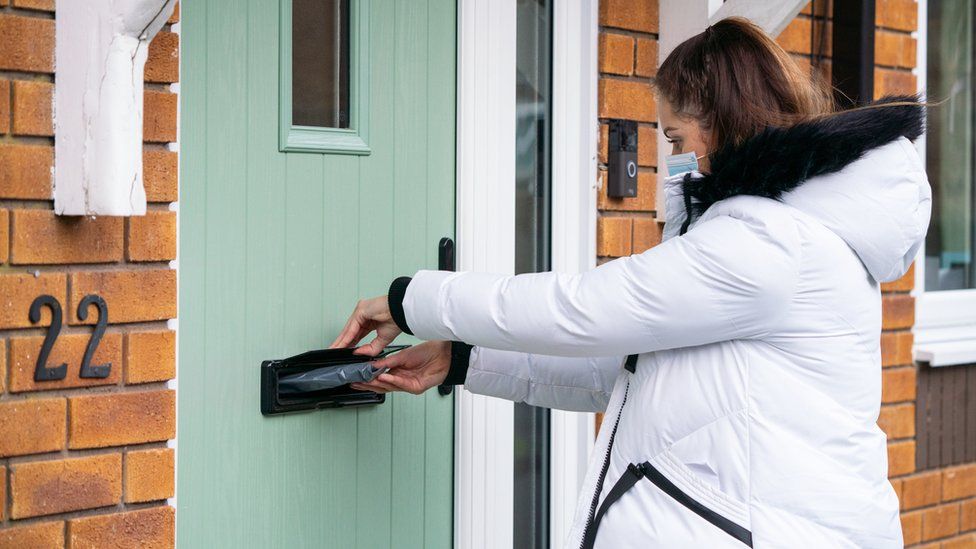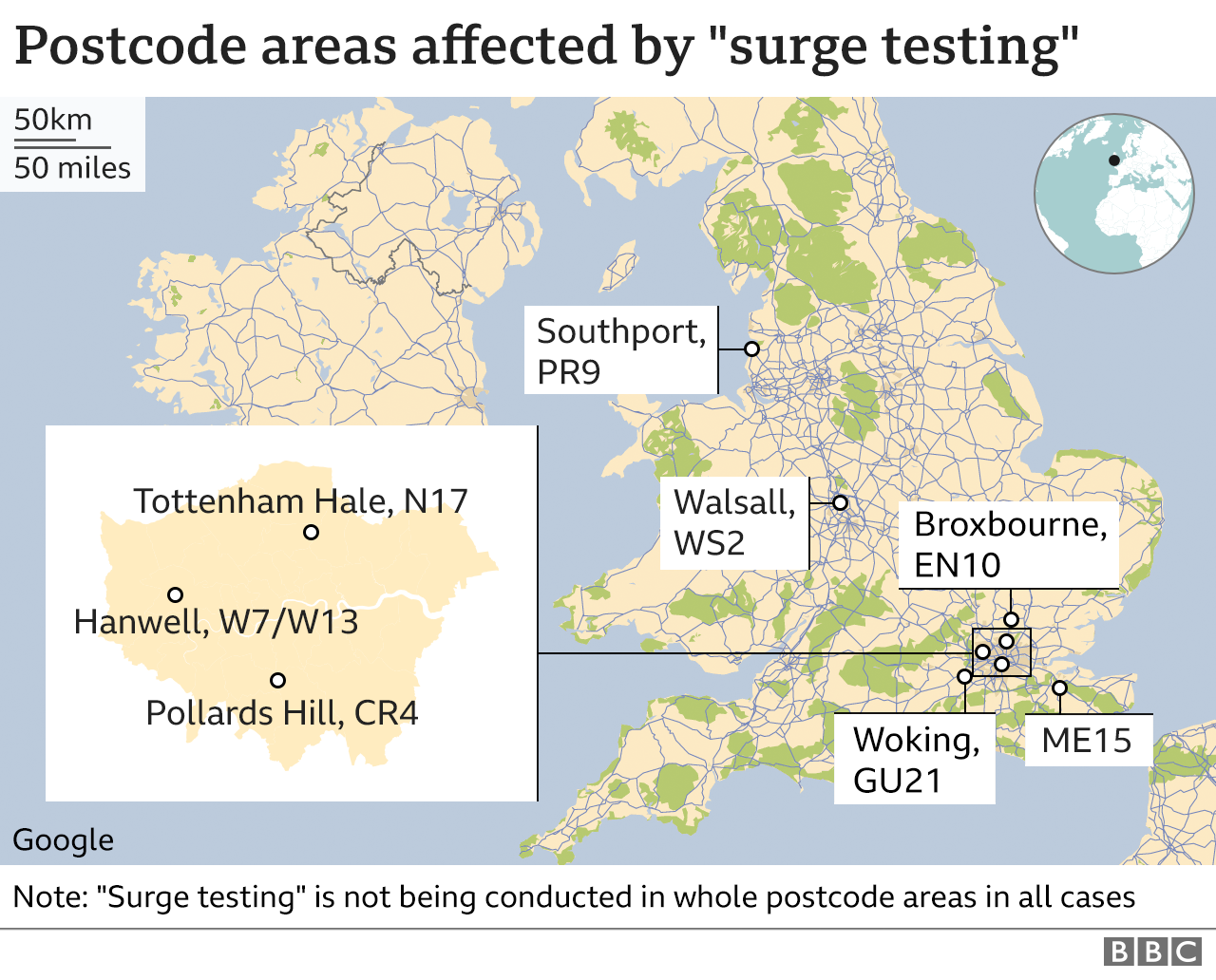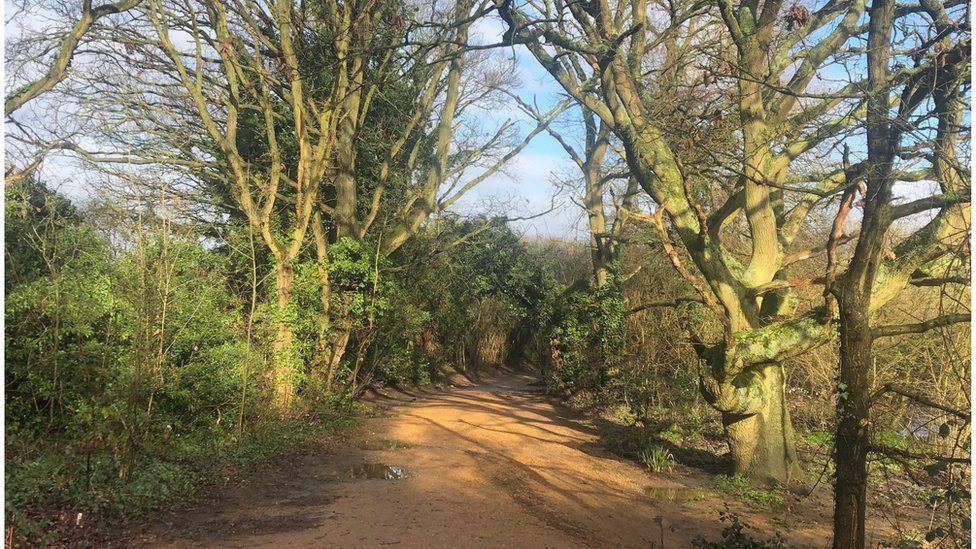
It is "critical" that people in areas singled out for enhanced testing for the South African variant stay at home, the health secretary has said.
Matt Hancock told MPs those in affected postcodes should only go out when "absolutely essential".
On-the-spot doorstep tests, home testing kits and mobile testing units will be deployed in a number of areas.
The aim is to reach 80,000 people, amid fears the more infectious variant may be spreading in communities in England.
Gene sequencing has so far uncovered 105 cases of the variant, which - like the variant previously discovered in Kent - is thought to be more contagious although not more deadly.
Eleven of the cases of the South African variant had no link to foreign travel, prompting concerns it is spreading in the community.
Dr Susan Hopkins from Public Health England said the existing vaccines may offer less protection against the South African variant, although they still offer a good level of immunity.
"Surge testing" means that over-16s who live or work in these areas will be asked to take tests whether or not they have symptoms:
- Parts of the W7 and W13 postcode areas in Hanwell and West Ealing in west London
- Parts of the ME15 postcode area in Kent
- Parts of the WS2 postcode area in Walsall in the West Midlands
- Parts of the GU21 postcode area in Woking, Surrey
- Parts of the PR9 postcode area in Southport
- The CR4 postcode area around Pollards Hill in south London
- Tottenham Hale in the N17 postcode area of north London
- The EN10 postcode area in Broxbourne


In most of the areas, home testing kits are being delivered and collected, while some local authorities are also providing mobile testing sites. The tests will be PCR ones, which involve swabbing the nose or throat and are regarded as the most reliable.
The health secretary told the Commons: "We have also seen 11 cases of mutations of concern in Bristol and 32 in Liverpool, and are taking the same approach.
"In all these areas it is imperative that people must stay at home and only leave home where it is absolutely essential."
He also urged people to take a test if offered one by their local authority.

'Why not test all the postcode?'

By Suzanne Leigh, BBC News
Hanwell, W7, is arguably one of London's best kept secrets. There's a village-like feel in parts and a carnival, a free music festival, a zoo - all either cancelled or closed at the moment, of course.
But still open are the wide spaces of parkland. The River Brent and Grand Union canal thread through and the area is a haven for wildlife. Red kites can regularly be seen hovering over the golf course; herons and an egret are a frequent sight and if you're really lucky you'll spot a water rail or kingfisher. Bats nestle under the viaduct, anecdotally a favourite spot of Queen Victoria's - she would request that her train pause there so she could admire the view.
It's a bit quieter than usual this morning. People are noticeably giving each other more space and the only hubbub is around the newly opened vaccination centre at the church hall.
But there's also confusion. Why not test all of the postcode? Why aren't there more test appointments?
There are roads split between those deemed to be in the danger zone and those outside it. How does that work?

Meanwhile, travellers arriving in Scotland from abroad may be asked to quarantine in a hotel to minimise the risk of new variants entering the country, First Minister Nicola Sturgeon has said.
She told MSPs her government intended to introduce a "managed quarantine requirement" for anyone who arrives directly into Scotland, regardless of which country they have come from.
The first minister added that she could not "unilaterally" impose these restrictions on people landing elsewhere in the UK and travelling to Scotland, but hoped the other administrations would work with the Scottish government to reduce the number of people doing so.
The policy goes further than the new quarantine system for England, which is due to be introduced in the coming weeks and only requires those arriving from countries under travel bans to isolate in hotels.
Labour has called for hotel quarantine to apply to all UK arrivals.

- NEW VARIANTS: How worried should we be?
- VACCINE: When will I get the jab?
- LOCKDOWN TIPS: Five ways to stay positive
- TEST AND TRACE: How does it work?

In December, the discovery of the new strain prompted a ban on foreign nationals travelling into the UK from South Africa and later from southern African countries.
Under current restrictions, people arriving into England from anywhere outside the UK, Ireland, the Channel Islands or the Isle of Man need to isolate at home for 10 days and provide a negative Covid test result before travel.
According to the Times, the government's Scientific Advisory Group for Emergencies (Sage) warned Downing Street that only closing the borders or introducing mandatory quarantine for all would stop new variants entering the UK.
But a government source told the BBC the report was "not accurate" and the prime minister "was not advised to stop all travel".


Completely stopping the spread of the South African variant is probably not realistic.
For one thing, these 11 cases have only been spotted by random checks on 5-10% of all positive cases. There are bound to be more.
So why the testing blitz? It's because of the delicate position we're in.
Vaccination is being rolled out quickly and many vulnerable people are building up immunity.
Anything that interferes with that will have significant consequences - so even just slowing the spread will be really beneficial.
But once vaccination is complete and there is significant immunity across the population, the impact of mutations becomes much more diluted.
This is why maximum vigilance is needed now, but in the long-term we can still be confident we can get on top of this pandemic.
Viruses mutate, but coronaviruses - certainly compared to the flu, which sees different strains circulating every year - tend to be relatively stable.
So, even with the mutations we are seeing, the vaccines still offer a very good degree of protection - even if that protection is not quite as high as it was against the original form of the virus.
What's more, it is relatively straightforward with this generation of vaccines to re-engineer them to work better against the mutations that have been seen.

In other developments:
- The variant first discovered in Kent appears to be undergoing some "worrying" genetic changes already seen in the South African and Brazilian variants, scientists say
- There were more than 9,000 deaths linked to Covid in the UK in the week ending 22 January, up by nearly 1,300 on the week before, an analysis of death certificates shows
- Scotland's youngest pupils are likely to return to the classroom full time from 22 February as schools start a phased reopening

- CHINA AND THE PANDEMIC: The gulf between what Chinese officials knew and what they told the world...
- FOOTBALL, RACISM AND ME: Anton Ferdinand explores racism in the game from a personal perspective



Do you live in an area where the South Africa variant is suspected? Tell us your concerns by emailing: haveyoursay@bbc.co.uk.
Please include a contact number if you are willing to speak to a BBC journalist. You can also get in touch in the following ways:
- WhatsApp: +44 7756 165803
- Tweet: @BBC_HaveYourSay
- Or fill out the form below
- Please read our terms & conditions and privacy policy
If you are reading this page and can't see the form you will need to visit the mobile version of the BBC website to submit your question or comment or you can email us at HaveYourSay@bbc.co.uk. Please include your name, age and location with any submission.
https://news.google.com/__i/rss/rd/articles/CBMiJGh0dHBzOi8vd3d3LmJiYy5jb20vbmV3cy91ay01NTkwNjM2NdIBKGh0dHBzOi8vd3d3LmJiYy5jb20vbmV3cy9hbXAvdWstNTU5MDYzNjU?oc=5
2021-02-02 14:20:00Z
52781345097209
Bagikan Berita Ini














0 Response to "Covid-19: 'Critical' those in South African variant test areas stay at home - BBC News"
Post a Comment